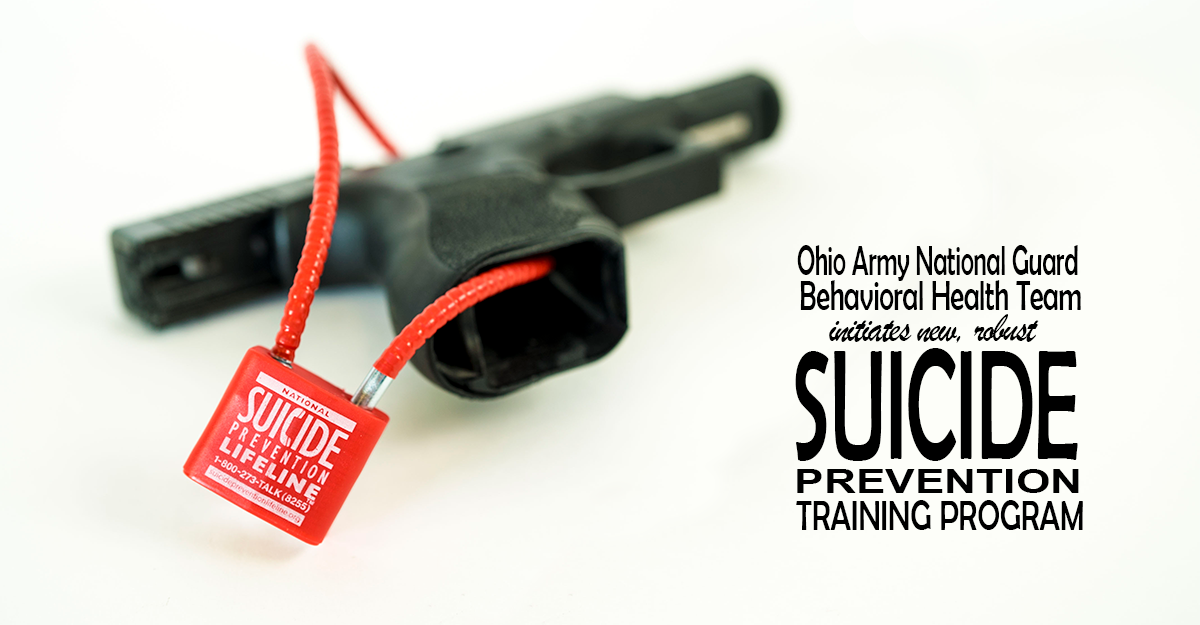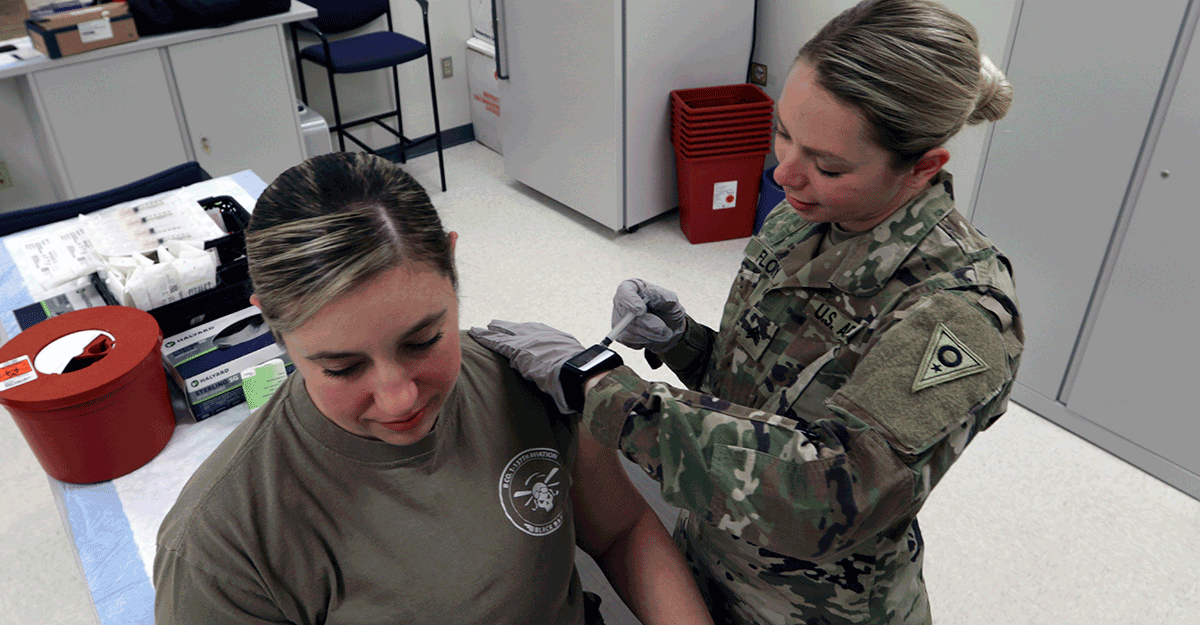May is National Mental Health Month
Ohio Army National Guard Behavioral Health Team initiates new, robust suicide prevention training program
Story by Sgt. 1st Class Chad Menegay, Ohio National Guard Public Affairs
COLUMBUS, Ohio (05/29/20)
The Department of Defense’s Annual Suicide Report released in September 2019 stated that the National Guard has the highest suicide rate of all military components. The figure can be argued to be relatively small — at less than one-tenth of 1%. However, at 30.6 suicide deaths per 100,000 Guard members, one suicide is too many. The suicide rate is higher than for the National Guard’s active duty and reserve counterparts and also significantly higher than the general U.S. population of 18.2 per 100,000 people for ages 17-59.
In the first in a series on suicide prevention, we explore who is working to solve the National Guard’s suicide problem, and where have we responded to that problem successfully.
The Ohio Army National Guard Behavioral Health Team has initiated a suicide prevention training program based in part on findings from an ongoing, 12-year longitudinal study of the organization’s members that assesses military and civilian factors related to mental health risk and resilience.
The training program is simply called First Line Leader Training, and its focus is on teaching key leaders how to better connect with their people.
Research shows that the less connected a Soldier feels to his or her organization, the more likely he or she is to have maladaptive behaviors and/or commit suicide.
The OHARNG Behavioral Health Team looked at over 20 published research articles based on the Mental Health Initiative, which links the OHARNG with university researchers from major institutions across the country, and looked at its own Unit Risk Inventories, or URIs, which are periodically administered surveys that allow Soldiers to give an honest, anonymous assessment of their well-being, and offer commanders the ability to gauge unit readiness and resilience.
“One of the primary things was that if people don’t feel part of the organization, if they don’t feel respected and connected, then we lose them, not just necessarily death by suicide, but we lose Guard members,” said Colin Fowler, a psychological health coordinator for the OHARNG. “It’s also a huge retention issue.”
The Mental Health Initiative findings also aligned closely with findings of a local academic research study, which provided critical analysis and recommendations to improve the OHARNG’s Soldier retention program.
A loss of the connective tissue in the organization is a concern on many fronts. The Behavioral Health Team is energized by the impact this approach could have on the organization and lives of many Soldiers within its ranks.
“We came up with a great number of second and third-order effects that we think will be positively impacted across the board — from increased retention to decreased suicidal ideation, increased understanding and increased trust in leadership,” said Maj. David Kirker, the OHARNG’s director of psychological health.
Diversity and inclusion is also a piece that the team brought into the training. People have implicit and explicit biases, and it’s important for leaders at all levels to be educated and self-aware, Kirker said. The FLL training is thought, then, to improve prevention of not just suicide but discrimination as well.
“We didn’t see them as separate issues,” Fowler said. “We can work to address both issues.”
First Line Leader, or FLL, training works to connect leaders to their subordinates, to improve understanding of one another and to build unit cohesion. It takes aspects from a variety of psychological assessments to include: the Four Lenses Program, a version of the Myer-Briggs Type Indicator; the Dunn Rankin Interest inventory, which focuses on motivation, rewards and is a behavior modification tool; and the Holmes-Rahe stress inventory.
The new suicide prevention training is more robust than what has been required of units before — what has traditionally been a mandatory annual briefing — and focuses on prevention more than intervention.
“We want prevention way farther upstream before someone is standing on the edge,” Fowler said.
Suicide prevention annual briefings at the unit level are currently designed to be an hour long, but there is concern that some units could turn an annual briefing into something shorter to whip through it and simply check a box.
The new FLL training is thought to be a better fit for a modern military.
“This is us creating a preventative training that by a third-order effect will prevent suicides,” Kirker said. “We’re not talking directly about suicide; we’re building connections with leaders and members, increasing job satisfaction in the military and the Guard. It’s rooted within Army leadership, focused on human interaction and connection. You feel heard, understood and connected.”
Part of the training is rooted in graduate-level counseling classes. “You’re going to sit down and practice nonverbals, listening, reflective statements and summarizing statements,” Kirker said. “They teach you this when you go through your NCOES (Noncommissioned Officer Education System) and your OES (Officer Education System), but this training will help you practice it as a leader to become more confident and comfortable.”
Of course, Soldiers can still turn to others in their units and chains of command.
“A certain percentage of Soldiers within each unit are supposed to be ASIST (the Army’s Applied Suicide Intervention Skills Training) trained,” Fowler said, “and chaplains are available within battalions.”
However, it was decided that more should be done at the unit level, and the Behavioral Health Team has been working on a version of the FLL leader training for three years.
“Recent stuff coming from the National Guard Bureau and the Secretary of the Army had sent out that Soldier care and being there for our people is a primary focus,” Fowler said.
So, the team put on a couple pilots for the training with units that were struggling on their URI scores, and the results were encouraging. During the trial runs, URI scores improved by 25 points the next year.
To help facilitate the training, the Behavioral Health Team created a manual and has trained retention NCOs, first sergeants and command sergeants major, and presented at the annual OHARNG Army Leaders Conference last fall with a three-hour training block.
“I think the large majority of people received it well, and now we’re at the stage of getting it into DTMS (the Army’s Digital Training Management System) as a training,” Kirker said.
A requirement was put out for all units to complete FLL training for Training Year 2020, however COVID-19 restrictions limiting units from performing regularly planned drills for multiple months this spring have pushed for portions of the training to be made available online, with some other parts to be conducted later in person, when regular drills resume.
The Behavioral Health Team was scheduled to be participate in a panel at the National Behavioral Health training event for the National Guard Bureau in Montana this year, to present about the findings from the Mental Health Initiative, but the event was canceled due to Department of Defense travel restrictions imposed during the COIVD-19 pandemic.
“I’m told it’s the first of its kind,” Kirker said about the Mental Health Initiative. “It’s been going on for 12 years, and there’s not one like it across the country that I know of.”

